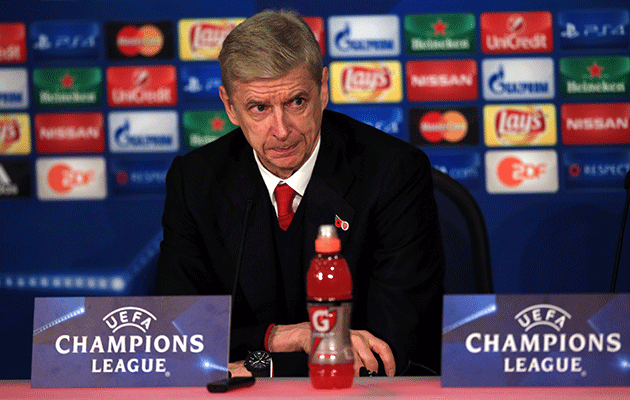After Arsenal’s fortuitous 2-0 win over Bayern Munich at the Emirates, and before their pitiful collapse in the return, Pep Guardiola, the Bayern manager, derided the long ball methods the Gunners had employed in the first game.
Well might he do so for despite the 2-0 victory, they seemed a betrayal of all that Arsene Wenger had stood for for so long. An emphasis on skilled, sometimes intricate, rhythmic build up sometimes, it is true, criticised for its alleged lack of final penetration, but a pleasure to watch and a tribute to Wenger’s perfectionism; even if a couple of seasons ago the wheels came off at least three times.
But in Germany, the wheels came off disastrously. On an occasion when they might well have been excused for letting down the drawbridge, they were simply and embarrassingly overwhelmed.
An edgy 1-1 draw against the old enemy Tottenham at the Emirates followed, and mitigating voices were heard suggesting that with the Gunners seemingly doomed for the first time for so many years to go out of the European Cup at the first stage, they can – what an ancient chestnut! – now concentrate on the League! In those days the reference was to being knocked out of the FA Cup.
Whatever, the fact that Arsenal still seem to be challenging so strongly for their first Premiership for so many years surely tells you something about its overall standard.
And Wenger fatally left Cech out of the lost game versus Olympiakos.
At Craven Cottage, where Birmingham City overwhelmed poor Fulham 5-2, one saw a spectacular emerging talent. Demarai Gray is only 19-years-old, and one of only two players on the club’s squad – the other a reserve goalkeeper – actually to be born in Birmingham.
At 18, he was a regular first choice all season. Now, his salient gifts surely make him an England right-winger of the near future. Fulham could do nothing with him, whether he was deploying his grace and pace, his ball control and readiness to beat his man, on the right or on the left.
This was further concrete evidence that, despite the narrow orthodoxy of past English years, when wingers were absurdly seen as an irrelevant luxury, they still vigorously and excitingly live. Moreover, they can still delight us and profit their team by getting outside their marker, reaching the goal line, and pulling the ball back into the middle for the most dangerous pass in the game.
Gray can effortlessly do that and much more.
Alas, the old so-called Peter Principle has been all too plain, demonstrated in West London where, in quick succession, both Chris Ramsey at Queens Park Rangers and Kit Symons at Fulham have lost their managerial jobs.
The Peter Principle, conceived by a knowing American academic, being that in an organisation, a member will be elevated just one step higher than he can cope.
When Harry Redknapp decided to bow out at QPR, Chris Ramsey was after a trial period, moving up from a secondary role, somewhat surprisingly confirmed as number one. Surprisingly because he had made at least one major and expensive error, playing an inexperienced teenaged right back at Crystal Palace, where he was all too predictably taken apart by the formidable Yannick Bolasie. Nor would things improve after relegation.
Meanwhile, Kit Symons, a successful youth coach, was made Fulham’s manager after the disastrous reign of the dictatorial German, once a European Cup final winning scorer for Hamburg, Felix Magath.
There was no doubt that the Fulham players breathed more easily, but before long it grew clear that Symons both in terms of tactics and selection was making mistakes.
Ironically his departure following the 5-2 rout by Birmingham City, came so soon after a couple of impressive wins, at four goals a time, sandwiching an honourable defeat at Burnley.
There’s, alas, no end to it. The Russian doping scandal overshadows any such problems soccer has, but it now emerges that Germany may have bought the 2006 World Cup. And what about South Africa and that mysterious payment?







